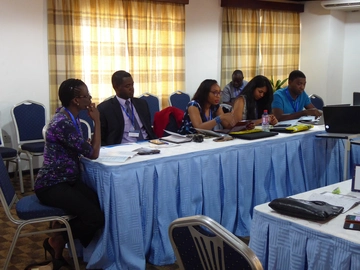"African women need to be economically empowered!" Interview with Dr. Fatuma Mninde-Silungwe
December 01, 2018.
Interview with Dr. Fatuma Mninde-Silungwe, who is a lawyer from Malawi and Alumna from the South African German Center for Transnational Criminal Justice. The interview took place during the 2nd DAAD Centers for African Excellence Alumni Conference in Akosombo, Ghana, where Fatuma gave a presentation on Contributing to the Achievement of the SDG 16 on Peace, Justice and strong Institutions through Training in Transnational Criminal Justice and Crime Prevention in Africa. She has done research in International Criminal Law and in Electoral Law. Her fields of interest include International Criminal Law, Criminal Justice, Elections, Human Rights and Good Governance. She currently works as a Legal Analyst on Elections with the United Nations Development Program in Malawi.
Could you tell us something about your academic career?
I studied law at the University of Malawi. At Master's level, I studied for an LL.M. and Transnational Criminal Justice and Crime Prevention which I completed in 2013 with a cum laude. During my LL.M studies, I specialized in Anti Money Laundering, Anti-corruption, International Criminal Law and Transitional Justice. Then I proceeded to do my PhD in International Criminal Law. My PhD research was on Regionalization of International Criminal Justice in Africa and I graduated on 27 August 2018.
What kind of influence did the DAAD-scholarship have on your career?
I would say my career has progressed substantially, because when I joined the program to do my Masters, I was working for the Government of Malawi as a State Advocate. After my Masters I was able to get the job where I work now, with the United Nations Development Program as a Legal Analyst. The minimum qualification was a Master of Law Degree so – obviously – If I had not had it, then I would not have gotten that job. So yes, the scholarship has influenced my career progression. I also think with the qualifications I have acquired, I will be able to get other opportunities, whether within the same institution or in different ones.
Do you think the DAAD scholarship can help women to combine career and family in a better way?
I think it does. I’ve seen others who have benefited from DAAD scholarships getting a stipend for their children and even for their husband when they are studying abroad. So, it helps the family to be together, especially when such kind of funding is provided to cater for family members.
Apart from the family, what does a scholarship mean for women?
One key issue in terms of African women is that we need to be economically empowered! And with more education comes more opportunities for employment. I am economically empowered because I am educated. That’s important for a woman. Apart from economic empowerment, advancement in education enables women to contribute and influence policy from an informed point of view. Such policies include policies that encourage inclusion of women in different areas of the economy and governance of different African countries.
Regarding the empowerment of African women what do you think can the DAAD improve when it comes to the empowerment of women?
I think DAAD can do more in terms of opening up opportunities for qualified women enable them access to education, because most of such women are not able to get funding to go and study abroad or even within their countries. As such by providing scholarship opportunities for them, women will be able to have access to education which is really important. In addition, in terms of research within the DAAD Centres of Excellence, the research could focus on how gender can be mainstreamed in all the courses of the Centres, because I believe gender is an overarching issue whether we are studying International Criminal Law, Transitional Justice or other courses. So DAAD should support the Centers to ensure that they are including gender in their course work.
To what extent can we talk about Africa in general?
It’s important to note that Africa is a continent of 54 countries and each country has its own social-economic development issues. It’s not good to generalize and to say: Africa is this and that. You need to go the individual countries and regions and assess what kind of needs those countries have. As such, when designing any program at a country-level, it should be a program that will fit the needs of that particular country, not just putting Africa on one platter. We also have the European Union with different countries and so we have the African Union with 54 countries. It’s important that people are aware of that.
The Interview was conducted by Lani Marie Doehring, working with the Ghanaian-German Center for Development Studies at ZEF. The interview was held during the 2nd DAAD Centers for African Excellence Alumni Conference in Akasombo, Ghana. Read more about the conference <link https: www.zef.de media-center news news-single-view article external-link-new-window internal link in current>here.
You can read the interview with Dr. Darlington Sibanda from Zimbabwe and Alumnus of the University of the Western Cape in South Africa on "There is a need to reach more African students who can benefit and go back to make an impact in their own countries" <link https: www.zef.de media-center news news-single-view article external-link-new-window internal link in current>here.


